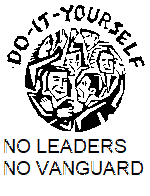Capitalism has advanced the scientific and technological capabilities of humanity to a stage where we can now feasibly establish a world of abundance, a world without waste or want or war. But the facts speak for themselves. There are now more hungry and homeless people on the planet than at any time in human history.
The Socialist Party is a companion party of the World Socialist Movement. It aims to bring about a non-violent revolution in the ownership of the means of production from private or state to common. In such a society, money will no longer be necessary, as the things and services we require to live fully (food, clothes, medical services, homes, transportation, and other modern human needs) will be freely available to all. This is because the means of production will be owned in common by the entire community, and will be democratically controlled by that community as well, a society in which leaders are replaced by truly democratic decision-making of all citizens.
In a society of common ownership, all war in such a nationless world will be immediately abolished, while the end of starvation and dire poverty will quickly follow suit. Without the barriers of economic cost holding back human progress, more ecologically sustainable ways to provide energy and production for ourselves will be immediately planned and created on a global basis. We will become for the first time in history a truly human family looking after itself.
The only real remedy is to seek at elections a mandate to abolish capitalism. If capitalism were abolished and socialism introduced there would immediately be two big developments through which the poverty, problem of the working class could be solved by increasing the number of men and women actually engaged in production.
One is that the members of the capitalist class, no longer able to live in leisure and luxury at the expense of the workers, would become useful members of the community helping to produce the articles needed by the community.
The second is that all kinds of activities necessary to capitalism but unnecessary under socialism would cease, and this would free millions of workers for production who are now engaged in banks, insurance companies, and advertising, or in the taxation and rating departments of the central and local government; as well as those now required by the capitalists to serve in the armed forces for the competitive struggle with foreign capitalist groups. As we explain the output of wealth could be at least doubled by these means.
This is the only way in which the poverty problem can be solved and governments, trying to run the capitalist system, cannot solve it. What they are doing is acting as caretakers for the capitalist class, calling on the workers to increase output but using seductive arguments about “service to the community" which would only be justified if in fact the means of production had been transformed or were going to be transformed into the property of the whole community. While maintaining (with merely superficial changes), the system under which the capitalists exploit the working class. Governments are pretending that exploitation has ended.
It is clever propaganda, but the realities of the class struggle between those who own, but do not produce and those who produce but do not own, will not for long be smoothed over by even the most plausible reformist orator. The working class faced with the same old ruthlessness of capitalist employers will find that they have no defence except the limited defence provided by their own trade unions. In strikes and lockouts, the web of half-truths spun by the labour leaders will be rent asunder, and the workers will have made an advance towards the necessary understanding of the fact that socialism has nothing in common with Labourites.






